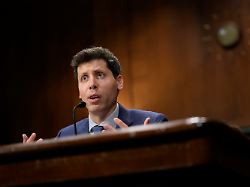“Carries Serious Risks”
OpenAI boss draws parallels between AI and atomic bomb
05/18/2023 3:27 p.m
Sam Altman has been interested in computers since he was a child. With ChatGPT, the OpenAI boss is launching an AI revolution. But the face of artificial intelligence not only praises the development – and even calls for government regulations for the sector.
When Sam Altman talks about the rapid development of artificial intelligence, he is both an enthusiastic supporter and a cautious admonisher. “Artificial intelligence has the potential to improve almost every aspect of our lives,” the head of ChatGPT developer OpenAI told the US Congress this week. “But it also carries serious risks.”
The 38-year-old technology entrepreneur has become the face of artificial intelligence with the release of ChatGPT. However, he is aware of the fears of many people with regard to the far-reaching changes that AI could bring. At a hearing in the US Senate, for which he exchanged the casual clothing customary in Silicon Valley for a dark blue suit and tie, he campaigned for government regulations for the sector to curb potential risks, among other things.
When OpenAI was founded as a non-profit company in 2015, it was all about dealing responsibly with artificial intelligence. At the time, the founding team, which included Altman, Tesla boss Elon Musk and a number of AI experts, explained that AI could bring great benefits to society, but also potentially cause great harm. “Our goal is to advance digital intelligence in a way that is most likely to benefit humanity as a whole.”
Critics warn against spreading false information
OpenAI then caused a sensation in November with the release of the chatbot ChatGPT, which can create complex texts in seconds. The high-profile step made the potential of AI clear even to laypeople and at the same time raised major concerns about the future development of this technology. Critics warn, among other things, that artificial intelligence could lead to the spread of false information, destroy jobs and ultimately become beyond human control.
Altman is aware of these risks. In an interview with a “New York Times” reporter, he once even compared the work of OpenAI to the Manhattan Project, with which the USA developed the atomic bomb in World War II. He told the New Yorker magazine in 2016: “We enslave AI, or it enslaves us.” The young entrepreneur is convinced that the development of artificial intelligence will take place anyway and that he can steer the development in a responsible direction as a pioneer.
Interested in computers since I was a child
Raised in St. Louis, Missouri, Altman was already making a name for himself in Silicon Valley long before ChatGPT made him a global player. He was already interested in computers and technology as a child: Altman was given his first Apple Mac for his eighth birthday.
As a teenager in the conservative Midwest, the internet helped him deal with his homosexuality, he told Esquire magazine in 2014. At first he had no one with whom he could talk about the subject, but found interlocutors and “human connections” online.
Altman studied computer science at Stanford University, but dropped out and founded the Loopt app, which allowed users to share their location with friends and family. He later joined startup incubator Y Combinator, which helped launch successful businesses like housing broker Airbnb and delivery service DoorDash. In 2014, Altman became the head of Y Combinator. He gave up the post five years later in order to be able to concentrate more on OpenAI.
There he drove the conversion from a non-profit company to a company that is allowed to generate and distribute limited profits. In 2019, the software giant Microsoft invested a billion dollars in OpenAI. In January, Microsoft promised another cash injection of ten billion dollars, according to media reports.
Sports car fan and hobby airplane pilot
But Altman is not only interested in artificial intelligence. The sports car fan and amateur airplane pilot has invested $375 million in the fusion energy startup Helion. Altman is also working on the cryptocurrency Worldcoin, whose users are supposed to be identified by their irises.
Altman believes technology, and AI in particular, can make the world a better place. “I’m super optimistic,” he once said on a podcast. “It’s always easy to read bad news and think about how bad everything is. But the good things are really good and they’re getting a lot better.”
